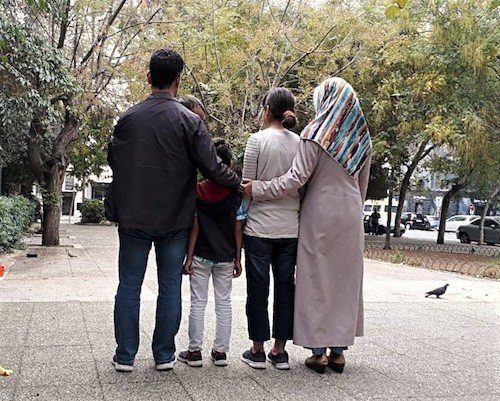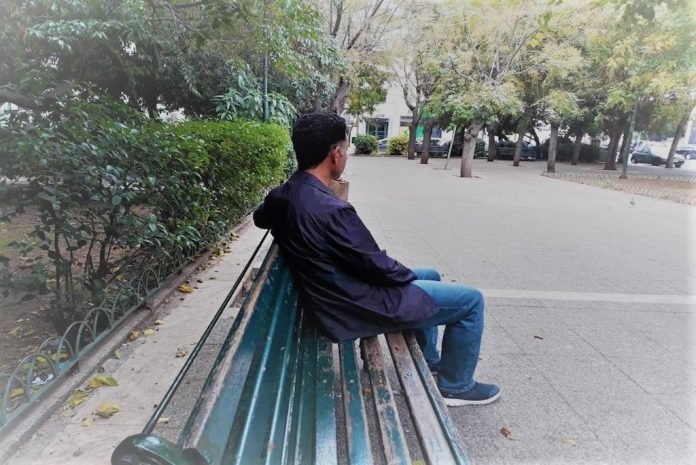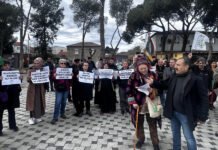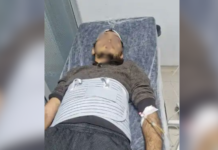“I was subjected to severe torture. They threatened me, saying, ‘Either you will talk or you’re going to die.’ After they tortured me, they showed me to my wife. They said, ‘There’s no way out for you, your wife won’t leave here, either.’ They increased the dose of torture day by day. They threatened me by saying that they were going to rape my wife. They put a bag over my head. I couldn’t breathe. I started to think I was dying.”

Mustafa K. and his wife’s heart-wrenching story is as follows:
Mustafa K. and Nilgün K. (37) had started teaching in 2013 at a Turkish school abroad. Mustafa K. was a social studies teacher. He was both an administrator and a teacher at the same school. His wife Nilgün was a science teacher. The family had two children. Their son Mesut Ekrem (8) and daughter Büşra Gülsüm (12) were trying to adjust to their new life in a new county.
Just as they began to adjust themselves to their new life they were forced to return to Turkey in June 2015. Mustafa K.’s father had a brain hemorrhage and was paralyzed. His mother was a schizophrenic. Mustafa K. rented an apartment in Ankara and brought his parents, who used to live in Sivas province, to his home. He was looking for work on the one hand and overseeing in his parents’ treatment on the other. After five or six months, he found a job at an international company. However, because of a schizophrenic mother and a paralyzed father and their treatment at hospitals, they had lived a very difficult year as a family.
They were in the hospital on July 15, 2016, the day Turkey survived a controversial coup attempt because Nilgün K. was five months pregnant with her third child, Ali İhsan, who is now 1,5 years old. She had a difficult pregnancy and had to spend much of her time in the hospital as in her previous pregnancies.
Following the coup, the couple, who had taught in private schools for 17 years, decided to return to the country where they used to work as teachers. They had guessed that a post-coup witch hunt targeting alleged members of the Gülen movement would include them also. However, they were prevented from leaving and were detained by police on September 11, 2016, at Ankara Esenboğa Airport.
Mustafa K. had been denounced by an informant as being a member of the Gülen movement and as a person who was organizing religious conversations on behalf of the movement. The couple was first taken to the Ankara Police Department then to the counterterrorism (TEM) branch. Mustafa K. was held in police custody for 30 days. He appeared in court on October 10, 2016, and released and put under house arrest because of the testimony he was forced to sign under police custody.
Nilgün K. was sent to court a few days after she was detained as she became seriously ill while in police custody. The court ruled to release her thanks to the state of her health.
However, Mustafa K. was tortured under police custody. He explained what he had experienced during his 30-day detention in a seven-page letter he gave to the court. He had experienced terrible ill-treatment and torture including violent beating, curses, harassment and keeping him naked, and even they had threatened him with raping his wife.
Mustafa K. explained what he had experienced in police custody in his letter as follows:

“My wife was 5,5 months pregnant and had very serious health problems. During the period of her pregnancy, she had been treated at Ankara Özel Ortadoğu Hospital and Zübeyde Hanım Women’s Hospital. Although we gave them this information, they did not listen to us. They insulted us and said: ‘The 5,5 months of pregnancy is nothing. All of you are terrorists. You will be punished for what you do.’ My wife was having a very difficult pregnancy. Most days she had to lie down and rest.”

“I was so embarrassed seeing Turkish policemen swearing and insulting horrible language. I’ve never heard such curses in my life. They even said they would rape my wife. Once, 4-5 police officers tortured me as well as insulted me by swearing at my loved ones, especially my spouse. They ordered me to repeat all these insults, too. I replied: “I can’t. I can’t say that. I’m a teacher.” They were so angry, they insisted. I told them again, saying, “I’ve never cursed in my life.” After my reply, they went crazy. I don’t remember what happened next.


“They also threatened me all the time, saying: ‘If you say anything you will not see your wife again. We can do the same to her.’ The doctor said she could not write a ‘no torture’ report. The police officers went berserk. They called their chief and they began to threaten the doctor. But the doctor said: “I took an oath, and I cannot break that. I cannot write a report for this man as if he were not tortured.”
“The police officers took me to another vehicle. They took my wife and the other detainees back to the police department. But my wife saw me in that state and she became sick. The police officers made a phone call, and a civilian came to the car. I guess that he was also a doctor. He looked at me and said: ‘You look quite healthy. You don’t have any problems.’ Then the police officers took me to another hospital. I couldn’t see the streets, but I thought they took me to a hospital in Dikmen. Thus, they were able to get a health report by hiding the torture that I was subjected to.

“After arriving at the branch, I wasn’t able to see my wife. They told me that she got sick, but they didn’t give any more information about her. I was so worried. I was so upset. When she saw me in the hospital in that state, her health had worsened. I was so frightened for her.
“After a few days’ break, they started to torture me again. They threatened me by saying that my wife was somewhere else and if I did not talk, they wouldn’t release her. They increased the torture day by day. They transferred me from the KOM branch to the counterterrorism (TEM) branch of the police department. They locked me up in a room downstairs. They introduced me to the personnel at the TEM branch, saying, ‘This is the guy who gave the order for the bombardment targeting the Ankara Security Directorate on the night of the coup.’ Everyone who heard that started to torture me. They increased the torture a lot.

“It this way I was held in police custody for 30 days. I had to give a statement under police custody due to torture and violence because I was no longer able to withstand it, and the violence was increasing with every passing day. The names of the police that I remember were Talip and Abdulkadir. Both of them are from the TEM branch.”
Mustafa K. wrote this letter as a document of torture on September 24, 2018, and sent it to the Ankara 25th High Criminal Court, where he had a hearing in his trial, through his lawyer, on September 25, 2018. He did not go to court. After he was given house arrest, they as a family had to return to his father’s house in Sivas province.
Mustafa K. had to live with an electronic ankle bracelet for 14 months. In the meantime, they had to get by with his father’s pension. His case had not yet been settled. He was accused of founding and managing a terrorist organization. He was forced to read the statement signed under duress in court. He had to accept his crime and express his regret for organizing alleged religious conversations. If he did so, he would receive a lesser sentence or he would be released. But he didn’t want to do that. His lawyer warned that in that case he would get between 10 and 22 years. Now he had only one option.
He broke the monitoring device and together with his family left the house on August 6, 2018. After they stayed in some other places for a few days, Mustafa K., his wife and their three children managed to flee to Greece.
Mustafa K. is now expressing his feeling with these words: “We have been in Greece for more than a month. I could not feel relieved for 20-30 days. I say every morning when I wake up that ‘oh my God, I hope this is not a dream’.”
According to Mustafa K., there is a special team in Ankara and they are employed to torture detainees in places called “private rooms.” “What happened there cannot be recorded. The threats of the police officers at the TEM branch against Mustafa K. were noted by him for history: ’We can do whatever we want. Your life is worthless. We can write a report and we can take care of everything. Your cost for us will be just a report. We are working for the state and we rule.”
Hundreds of thousands of people in Turkey have been the subject of legal proceedings in the last two years on charges of membership in the Gülen movement since a coup attempt on July 15, 2016, a Turkish Justice Ministry official told a symposium on July 19, 2018.
“Legal proceedings have been carried out against 445,000 members of this organization,” Turkey’s pro-government Islamist news agency İLKHA quoted Turkish Justice Ministry Deputy Undersecretary Ömer Faruk Aydıner as saying.
Turkey survived a controversial military coup attempt on July 15, 2016, that killed 249 people. Immediately after the putsch, the Justice and Development Party (AKP) government along with President Recep Tayyip Erdoğan pinned the blame on the Gülen movement.
Fethullah Gülen, who inspired the movement, strongly denied having any role in the failed coup and called for an international investigation into it, but President Erdoğan — calling the coup attempt “a gift from God” — and the government initiated a widespread purge aimed at cleansing sympathizers of the movement from within state institutions, dehumanizing its popular figures and putting them in custody.
Turkey has suspended or dismissed about 170,000 judges, teachers, police and civil servants since July 15, 2016. On December 13, 2017, the Justice Ministry announced that 169,013 people have been the subject of legal proceedings on coup charges since the failed coup.
Turkish Interior Minister Süleyman Soylu announced on April 18, 2018, that the Turkish government had jailed 77,081 people between July 15, 2016, and April 11, 2018, over alleged links to the Gülen movement.















